In Ukraine, the years of independence have been marked by numerous diverse art projects, festivals, and events aimed at strengthening national identity. Ukrainian culture is not only self-sufficient; it is a living organism that constantly changes and evolves. There is something intangible that unites people—an inner feeling, a special energy not easily described by logic. This is why both Ukrainians and foreigners resonate with the music of the band Dakha Brakha or respond to certain texts or figures. Intercultural dialogue possesses both an internal language, understandable to specific people, and a universal one, felt by others. Throughout history, some artistic figures have been so enigmatic that they have inherently left a legacy for future researchers. One such artist is Bruno Schulz—a Jewish painter and writer who lived in the city of Drohobych and wrote in Polish. Unintentionally, he united three cultures. In mid-July, the 11th festival named after him was held in his hometown of Drohobych, bringing together artists, researchers, cultural figures, and all those who deeply care about Schulz.
The enigmatic figure of Bruno Schulz
When you engage with the texts and drawings of Bruno Schulz, the silhouettes of Drohobych’s houses and streets emerge in the background. Conversely, when you visit Drohobych, you inevitably feel the presence of Bruno Schulz somewhere in the backdrop. His legacy, though not vast, is significant and shrouded in mysticism. His wall paintings were once stolen from Drohobych and taken to Israel by representatives of the Yad Vashem centre. Schulz lived under five different regimes without ever leaving Drohobych: the Austro-Hungarian Empire, the West Ukrainian People’s Republic, the Second Polish Republic, Soviet Ukraine, and the Third Reich, where he was eventually killed. Schulz continues to draw people into his world like a magnet, and some even wish to claim him for themselves. However, the festival’s values are entirely about the opposite process—Bruno Schulz, who unites and invites all into eternity.
The future artist was born into a Jewish family on July 12, 1892, in Drohobych. His father, Jakub, owned a shop. As often happens with gifted individuals, Bruno’s talents began to manifest early. He had a keen interest in art, prompting his parents to send him to the prestigious Imperial Gymnasium named after Franz Joseph. Many elites of the time, including Vasyl Stefanyk and Ivan Franko, graduated from this institution.
Both Schulz and his family took his education seriously. He studied at the Lviv Polytechnic and the Vienna Academy of Fine Arts and interned in Warsaw and Paris. His early artistic works, primarily as a painter, were imbued with fantasy, dream-like, surreal motifs. They seemed to offer a grasp of reality, but not the kind captured by the everyday eye. He drew with a pencil and developed a unique technique of scratching on exposed photographic paper.
While working as an art teacher at the Drohobych Gymnasium, Bruno Schulz probably never envisioned himself as a writer. He shared stories with friends, but it wasn’t until they persuaded him to write them down that his tales began to take shape. This eventually led to his debut collection, “The Street of Crocodiles” (originally “Cinnamon Shops”).
Schulz’s poetic and literary language is unique, resembling the gaze of a dreamer who focuses on details: colours, textures, shapes, aromas, shifting focus, and breaking physical laws. If one were to attempt to recreate Drohobych based on his works, it would be challenging to achieve topographical accuracy. This enticing mysticism and blurring of lines in his text open other doors—those of the subconscious, intuitive, and illogical. This aspect of his work has attracted researchers, literary scholars, and attentive readers to his figure for decades.
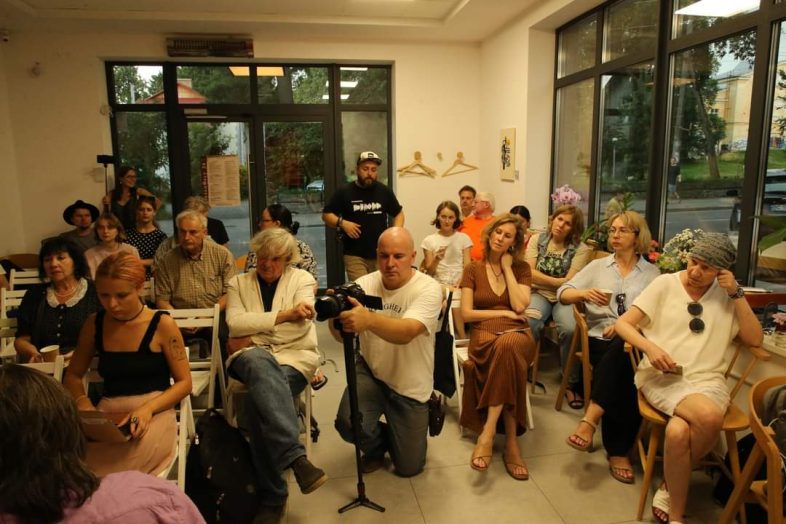
SchulzFest
Multiculturalism has always been inherent to Drohobych. Today, it’s not as vibrant, partly because much of the Jewish community left the city and Ukraine during past wars and repressions. However, the residents still carry this gene of interculturality, and there is a desire to revive this tradition. Thus, the Schulzfest art festival was initiated by the Polish scholar and Schulz researcher, Vira Meniok, and her husband, Ihor Menko. They decided to hold it every two years.
This year, the festival celebrated its 20th anniversary. Schulzfest brought together writers, poets, journalists, artists, performers, actors, literary scholars, critics, and genuine Schulz enthusiasts for the eleventh time. Each Schulzfest centres around a thematic vector that unites all events. This year’s theme, “short circuits of meanings,” was taken from Bruno Schulz’s essay “Mythologization of Reality.” It refers to poetry as a direct hit into the essence, its instantaneous and timely impact. The artistic act, the act of creation, is both foundational and meaning-forming simultaneously (creating new forms and meanings). This was the focus of participants’ reflections throughout the week.
Schulzfest featured several major components: short circuits of meaning, poems in shelters, and the continent of Drohobych. A special segment, Bruno4ever, brought together musicians, theatre actors, visual artists, and intellectuals from around the world, all of whom research and draw inspiration from Schulz’s work in various ways.
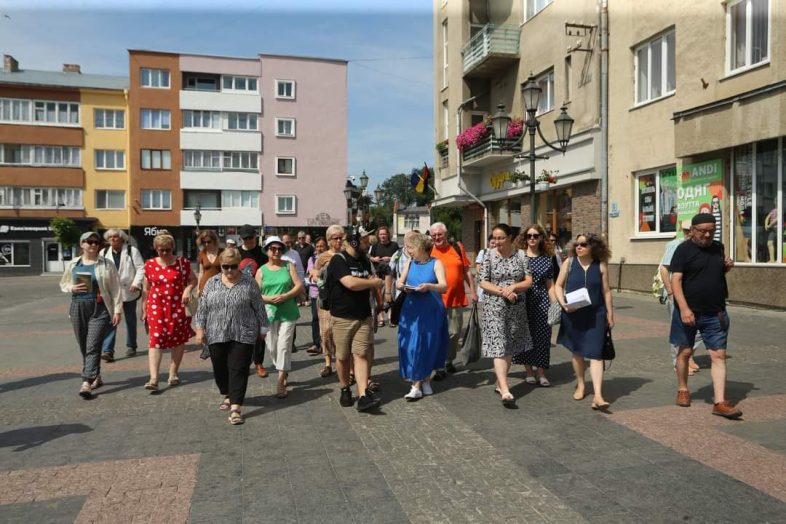
Poets on the Frontline
By tradition, Schulzfest opens with an inauguration, and each year, a keynote address sets the tone and direction for all events. This year, many symbols previously perceived theoretically have become part of daily life. Serhiy Zhadan, a festival participant who has a special affection for Drohobych and Schulz’s legacy, was supposed to attend. However, he is currently serving in the Armed Forces of Ukraine. Despite this, he recorded a video message for the opening, highlighting the fact that one of Ukraine’s leading writers—and perhaps one of the foremost contemporary writers—now has a completely different social role, risking his life along with many other Ukrainians.
The keynote address was delivered by the eminent Polish poet Ryszard Krynicki, who emphasized the bravery of Ukrainians defending not only their own country but also Europe as a whole.
Poems in Shelters
Since the beginning of the full-scale Russian invasion of Ukraine in February 2022, Schulzfest has introduced an important component—poems in shelters. The concept involves poets reading and discussing poetry in various shelters throughout Drohobych, including educational institutions and old villas. Each day of the festival features several such sessions. Poets not only read their works but also engage in mutual commentary. This segment was curated by a literary anthropologist, literary critic, professor of humanities, and member of the Presidium of the Polish PEN Club, who wove all the pieces into a coherent narrative.
The shelter readings were inaugurated by Yuriy Andrukhovych and Ryszard Krynicki at the Faculty of Primary Education and Art of Drohobych University. Commentary was provided by writer, poet, and translator Ostap Slyvynsky. Following them, Polish poet Jacek Podsiadło, who has also volunteered in Ukraine since the invasion began, and Ukrainian poet Hryhoriy Semenchuk read and discussed their work in the city hall shelter. Later, Oleksandr Irvanets and Alfred Wierzbicki brought humour and ancient metaphors to the rector’s building of Drohobych University, formerly the gymnasium where Bruno Schulz studied.
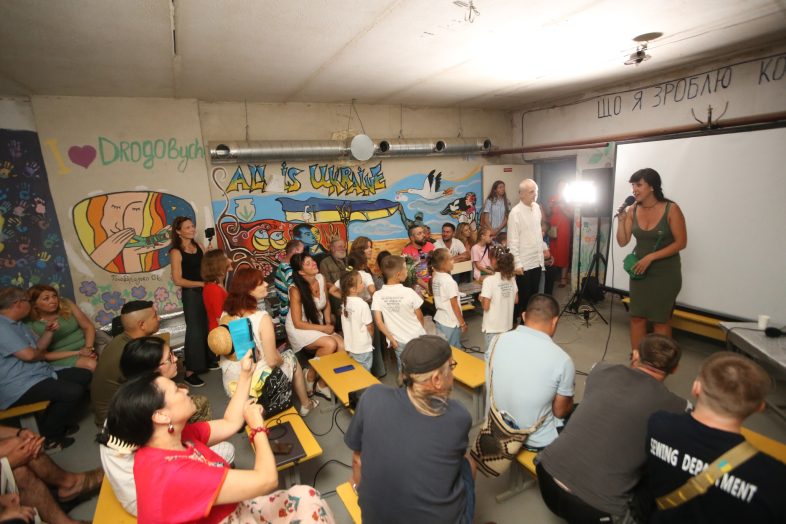
Photo: Bruno Schulz Festival | Facebook
Other readings included Tomasz Różycki and Ostap Slyvynsky at the shelter of Lyceum No. 3; Olena Rybka, Krzysztof Czyżewski, and Natalka Tkachyk at the shelter of the Faculty of History, Pedagogy, and Psychology of Drohobych University; and poets Kateryna Hladka, Nataliya Belchenko, and Katarzyna Kucinska-Kosani at the shelter of the Yaros Villa. At the Youth Pastoral Center, poetry from a collection compiled by Adam Michnik was read, and Yurko Prokhasko synchronised with him, voicing poetry by Rymaruk and an unknown author. The final event in this series took place at the shelter of Lyceum No. 16, where displaced children from various parts of Ukraine painted the walls and shared their volunteer achievements with festival participants. At this venue, poems by Kazimierz Wierzyński and Zbigniew Herbert were read and discussed by Yevhen Nakhlyk, Vira Meniok, Zbigniew Benedyktowicz, and Paweł Próchniak.
“There’s something profoundly special about descending into a shelter, even when there’s no immediate danger. We read poems in shelters, even when the air raid sirens are silent,” said Paweł Próchniak during one of the readings.
Indeed, this shared experience in an underground setting fostered a sense of secrecy, ritual, and intimacy, significantly heightening perception. Poetry not only amplifies and sharpens the present moment but also offers a key to timelessness. According to the organizers, while this segment of the festival was carefully planned with specific locations and poet pairings, no one anticipated its impact would be so significant.
Occasionally, air raid sirens interrupted the poetry readings, intensifying the wartime context and stretching meanings into eternity, appealing to the subconscious and intuitive. This effect was universal. The poets’ metaphors and images often intersected in unexpected ways. At times, the readings became a space to mourn what was lost, honour those who had perished, or approach life with irony, amplifying the female voice to chant for victory. Poems in shelters thus created a space for all forms of expression.
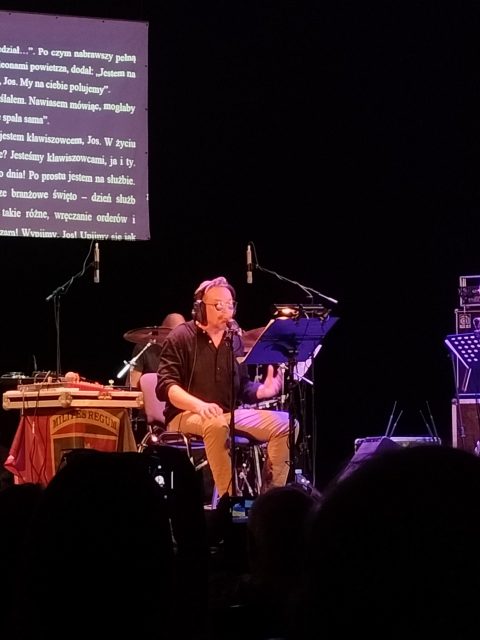
Theatre from Spain
Travelling across nearly the entire European continent to reach Ukraine and offer their cultural contribution was the driving motivation for Cambaleo Teatro from Madrid. They brought their play, De la noche una canción, to the festival. On stage, the duo—a man and a woman—embodied various elements and interactions. The production explored themes of personal relationships, boundaries, communication, and the dynamics of inner and outer listening. It also delved into societal borders, memory, the invasion of our minds, and the value of freedom.
“I am the memory that frees from the past
I am the trough that embraces the bodies you killed to satiate your ambitions
I am the joy of singing that you silenced to satisfy your hatred
I am all the smiles I kept while you weren’t looking
I am the last thought of an elderly person who died abandoned so that your calculations could be satisfied
I am the song that comforts you during the blackness of the bombing
I am the body of a woman rotting in the desert after being raped and amputated”
This excerpt from the performance draws the audience’s attention to our inner selves, revealing how a hidden monster can emerge and wreak havoc without mercy.
On the first day of the festival, I caught up with Antonio Sarrio Lema, an actor from Cambaleo Teatro and the lead performer in their play, about what brought them to Ukraine. He explained that they were well aware of the situation and had been actively involved in aid efforts. They realised they had their own cultural tool—theatre—and thought that they could also contribute by using it to strengthen and show solidarity through culture. That’s why they decided to come.
“You’re tuned in to RadioNight, and I’m your host, Yosyp Rotsky…”
This is how the acoustic play inspired by Yuriy Andrukhovych’s novel RadioNight begins. The story centres on Yosyp Rotsky, the main character, through whom Andrukhovych creates a nocturnal radio studio for the audience’s ears and imagination. The musical backdrop is provided by the Polish band Karbidio, with whom Andrukhovych has collaborated for many years.
Although the performance doesn’t directly connect to Bruno Schulz’s world, it represents a pioneering artistic effort, which is why it was featured in the Bruno 4ever section. It reminds us that Schulzfest has always been a platform for nurturing and showcasing new artistic expressions and forms.
The play offers an immersive acoustic experience, inviting the audience to close their eyes and delve into the depths of their consciousness and subconsciousness, exploring the intertwining of stories and the experience of war and pain. To date, Yuriy Andrukhovych and his team have performed the project twice in German and Polish, with its Ukrainian premiere happening here in Drohobych.
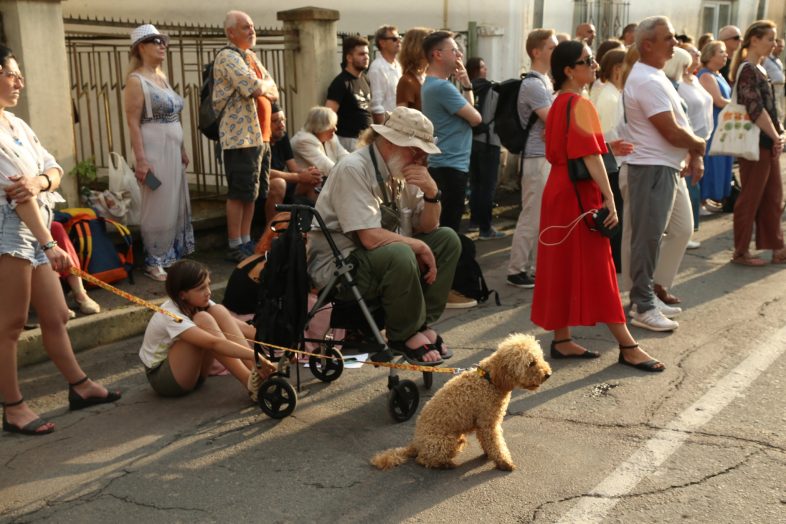
Photo: Bruno Schulz Festival | Facebook
Bruno Schulz’s Birthday and the Poetics of His Places
Bruno Schulz was born on 12 July, and this date is deliberately woven into the festival. His enigmatic figure and poetic language draw enthusiasts from Ukraine and around the world. His unique universe sparks dialogue, historical reflections, and the creation of new artistic projects.
A cherished tradition of Schulzfest involves participants walking through key locations in Drohobych that were significant to Schulz, reading excerpts from his essays. The event began at Rynok Square, near the site of the writer’s birthplace, and continued along Crocodile Street (Stryiska Street), as Schulz named it, moving through the theatre district and Pidvalna Street. Passages were read by Pawel Pruhniak and local teacher and historian Andriy Bury, who even distributed paper strips infused with a scent he imagined might evoke the aroma of the “Cinnamon Shops.” This journey through the city, with Schulz’s prose voiced by contemporary figures, served to unite the locations into a cohesive tribute to the writer. The event concluded on the former Florian Street, first in front of Schulz’s house and then inside it. A symbolic moment that opened the festivities on 12 July was when participants echoed the writer’s phrase from his essay: “Poetry is the short circuits of meaning between words, the unexpected rebirth of primordial myths,” in the basement of his house.
In the evening, Audiostories, the audio production company that recorded various festival events, presented an acoustic reading of Schulz’s novella In Search of a Voice: The Path of Dodo. Actor Oleg Oneshchak performed the reading from the balcony of Schulz’s house while the audience gathered on the street below to listen. The reading was accompanied by sounds recorded earlier in Bruno’s house and the delicate, whimsical music of Artem Bemba. This act of unity and remembrance is significant as it immortalises the meanings born from Schulz’s creativity.
Given the current war, Schulz’s fate and his struggle against the fascist regime resonate strongly today. However, the fascist threat now comes not from German lands but from Russian ones. Bruno Schulz was murdered in the city centre simply because he was Jewish, a fate shared by many today who suffer, are tortured, and face violence merely for being Ukrainian.
Throughout the festival, these ‘short circuits of meaning’ foster reflection and inspire new creative ideas, once again drawing people to the mystical figure of Bruno Schulz from Drohobych.

